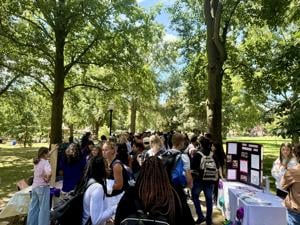 Festival ISU engages students, welcomes new RSOsFestival ISU, held last Tuesday and Wednesday on the Quad, gave students the opportunity to explore different ways to get involved. The Illinois State University Solar Car Team was one of over 250 organizations that participated in the event. The team is currently in the process of designing Mercury Eight, which they hope to build and race in two years. Solar Car Team President Mac Brody discussed the importance of gaining new members for the team. “[We want to get] enough people interested in the project now, so when it comes time to build that car, we have enough people that are dedicated and that have kind of that spirit to build and continue the program,” Brody said. New Registered Student Organizations (RSOs) made an appearance this year, including Redbird Animal Advocates. They are partnered with the Humane Society of Central Illinois. “We’ll have volunteer things at the shelter,” senior marketing major Emma Defort said. “We’ll do walks with the dogs. We’ll do supply drives to help get things for the shelter, just to kind of help shelter staff and help take the animals out,” Defort continued. Defort also added that the club was “very happy” with the engagement they received. The Francophone club also made an appearance. Senior French education major Tiffani Kawa is the president of the Francophone club and strives to make others comfortable about speaking French in an informal setting. “We meet two times a week, and we talk in French at any level,” Kawa said. “We help each other out because we have native speakers, and we have novice-level learners. And, we eat cookies…it’s just a bunch of fun.” The club also received interest from French-speaking Canadian students who wanted to engage with fellow French speakers outside of a classroom setting. Information about these clubs and more can be found on Redbird Life.
Festival ISU engages students, welcomes new RSOsFestival ISU, held last Tuesday and Wednesday on the Quad, gave students the opportunity to explore different ways to get involved. The Illinois State University Solar Car Team was one of over 250 organizations that participated in the event. The team is currently in the process of designing Mercury Eight, which they hope to build and race in two years. Solar Car Team President Mac Brody discussed the importance of gaining new members for the team. “[We want to get] enough people interested in the project now, so when it comes time to build that car, we have enough people that are dedicated and that have kind of that spirit to build and continue the program,” Brody said. New Registered Student Organizations (RSOs) made an appearance this year, including Redbird Animal Advocates. They are partnered with the Humane Society of Central Illinois. “We’ll have volunteer things at the shelter,” senior marketing major Emma Defort said. “We’ll do walks with the dogs. We’ll do supply drives to help get things for the shelter, just to kind of help shelter staff and help take the animals out,” Defort continued. Defort also added that the club was “very happy” with the engagement they received. The Francophone club also made an appearance. Senior French education major Tiffani Kawa is the president of the Francophone club and strives to make others comfortable about speaking French in an informal setting. “We meet two times a week, and we talk in French at any level,” Kawa said. “We help each other out because we have native speakers, and we have novice-level learners. And, we eat cookies…it’s just a bunch of fun.” The club also received interest from French-speaking Canadian students who wanted to engage with fellow French speakers outside of a classroom setting. Information about these clubs and more can be found on Redbird Life.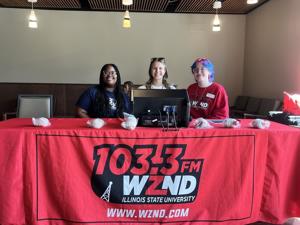 Event Management Dining and Hospitality kicks off new Coffeehouse Corner seriesOn Monday, Illinois State University’s Event Management Dining and Hospitality (EMDH) kicked off its new Coffeehouse Corner series in the Bone Student Center. The kickoff event took place on the stage near Starbucks. Student-led radio station WZND played music for the audience and handed out free stress toys. Remote Director for WZND and junior theater production and design student Juno Staudacher was excited that WZND was able to support the Coffeehouse Corner kickoff. “I love working alongside EMDH. I think this series of events is really cool, and I would love to attend some events myself. It’s good to utilize this stage in the Bone and I like seeing events here after Welcome Week,” said Staudacher. Even when some students were not aware of the event, they thought the idea of Coffeehouse Corner events was very beneficial. Junior integrated health and wellness student Annete Ulziibayar shared her thoughts. “I wasn’t aware that this event was taking place today, but I think this series of events is a good idea, especially for students who love music like me. I think I would’ve liked to see more promotion about it on campus, though,” Ulziibayar said. EMDH will be hosting Coffeehouse Corner events weekly throughout the upcoming semester. The event schedule can be found online. This series of events includes crafts, trivia events and live performances from different artists and students. Assistant Director of Marketing and Communications for EMDH, Samantha Schultz, shared her hopes for this new series of events. “This is a great way for students to take a small break from their crazy schedules to do something relaxing,” she said. Schultz also shared what she wants students to take away from these events. “Mental health and wellness are so important and vital to a student's life on campus. Ultimately, on an event-to-event basis, we hope students walk away feeling relaxed, happy, maybe with a new friend, and recharged,” Schultz said.
Event Management Dining and Hospitality kicks off new Coffeehouse Corner seriesOn Monday, Illinois State University’s Event Management Dining and Hospitality (EMDH) kicked off its new Coffeehouse Corner series in the Bone Student Center. The kickoff event took place on the stage near Starbucks. Student-led radio station WZND played music for the audience and handed out free stress toys. Remote Director for WZND and junior theater production and design student Juno Staudacher was excited that WZND was able to support the Coffeehouse Corner kickoff. “I love working alongside EMDH. I think this series of events is really cool, and I would love to attend some events myself. It’s good to utilize this stage in the Bone and I like seeing events here after Welcome Week,” said Staudacher. Even when some students were not aware of the event, they thought the idea of Coffeehouse Corner events was very beneficial. Junior integrated health and wellness student Annete Ulziibayar shared her thoughts. “I wasn’t aware that this event was taking place today, but I think this series of events is a good idea, especially for students who love music like me. I think I would’ve liked to see more promotion about it on campus, though,” Ulziibayar said. EMDH will be hosting Coffeehouse Corner events weekly throughout the upcoming semester. The event schedule can be found online. This series of events includes crafts, trivia events and live performances from different artists and students. Assistant Director of Marketing and Communications for EMDH, Samantha Schultz, shared her hopes for this new series of events. “This is a great way for students to take a small break from their crazy schedules to do something relaxing,” she said. Schultz also shared what she wants students to take away from these events. “Mental health and wellness are so important and vital to a student's life on campus. Ultimately, on an event-to-event basis, we hope students walk away feeling relaxed, happy, maybe with a new friend, and recharged,” Schultz said.
- Festival ISU engages students, welcomes new RSOsFestival ISU, held last Tuesday and Wednesday on the Quad, gave students the opportunity to explore different ways to get involved. The Illinois State University Solar Car Team was one of over 250 organizations that participated in the event. The team is currently in the process of designing Mercury Eight, which they hope to build and race in two years. Solar Car Team President Mac Brody discussed the importance of gaining new members for the team. “[We want to get] enough people interested in the project now, so when it comes time to build that car, we have enough people that are dedicated and that have kind of that spirit to build and continue the program,” Brody said. New Registered Student Organizations (RSOs) made an appearance this year, including Redbird Animal Advocates. They are partnered with the Humane Society of Central Illinois. “We’ll have volunteer things at the shelter,” senior marketing major Emma Defort said. “We’ll do walks with the dogs. We’ll do supply drives to help get things for the shelter, just to kind of help shelter staff and help take the animals out,” Defort continued. Defort also added that the club was “very happy” with the engagement they received. The Francophone club also made an appearance. Senior French education major Tiffani Kawa is the president of the Francophone club and strives to make others comfortable about speaking French in an informal setting. “We meet two times a week, and we talk in French at any level,” Kawa said. “We help each other out because we have native speakers, and we have novice-level learners. And, we eat cookies…it’s just a bunch of fun.” The club also received interest from French-speaking Canadian students who wanted to engage with fellow French speakers outside of a classroom setting. Information about these clubs and more can be found on Redbird Life.

- Event Management Dining and Hospitality kicks off new Coffeehouse Corner seriesOn Monday, Illinois State University’s Event Management Dining and Hospitality (EMDH) kicked off its new Coffeehouse Corner series in the Bone Student Center. The kickoff event took place on the stage near Starbucks. Student-led radio station WZND played music for the audience and handed out free stress toys. Remote Director for WZND and junior theater production and design student Juno Staudacher was excited that WZND was able to support the Coffeehouse Corner kickoff. “I love working alongside EMDH. I think this series of events is really cool, and I would love to attend some events myself. It’s good to utilize this stage in the Bone and I like seeing events here after Welcome Week,” said Staudacher. Even when some students were not aware of the event, they thought the idea of Coffeehouse Corner events was very beneficial. Junior integrated health and wellness student Annete Ulziibayar shared her thoughts. “I wasn’t aware that this event was taking place today, but I think this series of events is a good idea, especially for students who love music like me. I think I would’ve liked to see more promotion about it on campus, though,” Ulziibayar said. EMDH will be hosting Coffeehouse Corner events weekly throughout the upcoming semester. The event schedule can be found online. This series of events includes crafts, trivia events and live performances from different artists and students. Assistant Director of Marketing and Communications for EMDH, Samantha Schultz, shared her hopes for this new series of events. “This is a great way for students to take a small break from their crazy schedules to do something relaxing,” she said. Schultz also shared what she wants students to take away from these events. “Mental health and wellness are so important and vital to a student's life on campus. Ultimately, on an event-to-event basis, we hope students walk away feeling relaxed, happy, maybe with a new friend, and recharged,” Schultz said.

- Redbird Fresh Market returns for the 2025 academic yearThe Redbird Fresh Market is a program that helps bring fresh produce right to campus for all students. It offers high-quality and low-cost fruits and vegetables every week for eight weeks. The program was developed by students in the College of Business' Innovation Consulting Community course. They were tasked with creating a more accessible way for students to get healthy produce for a cheaper price. This program is open to and utilized by many on and off-campus students, along with the faculty and staff of Illinois State. Distribution is located once a week in the Bone Student Center on the second floor across from the Qdoba. First pick-up date will take place Friday, October 3, 2025, and will continue to Friday, December 5, 2025. Those who utilize the Fresh Market usually receive between eight and ten produce items each week. The Redbird Fresh Market purchases their produce in bulk quantities. Thus, allowing them to disperse them to participants at a cheaper cost. Any bags that are not picked up for the week will be donated to the School St. Food Pantry. This ensures the produce does not go to waste. The Office of Sustainability also offers a program that allows faculty, staff or community members to sponsor a student in need by ordering them a weekly bag of produce. More information about sponsoring a student can be found here. Students can also fill out a sponsor form. More information about filing for a sponsorship can be found here.

- Ameren Illinois partners with Normal for sustainable electric energyEnergy delivery company, Ameren Illinois, recently reached out to the town of Normal, offering a grant that would allow Normal to gain access to more sustainable electric energy, specifically electric vehicles. A series of meetings occurred to discuss the plan for the city. Assistant Director of Facilities Management for the town of Normal, Eric Heggie, spoke on the thought process behind this partnership between Ameren Illinois and the town of Normal. “Ameren took information from the town regarding what we use for fleet vehicles, various locations that we already have chargers at," Heggie said. "One question they had was how close a particular park is to an interstate. So just looking at things holistically across the town to say, 'Could there be chargers installed here? Are there vehicles that we are currently utilizing that could be replaced with electric vehicles?'” Ameren also has a fleet assessment division. “[Ameren] will look at our internal fleet vehicles and make recommendations or provide options if we choose to purchase [electric vehicles] to add to our fleet,” Heggie said. One of Normal’s main goals is to promote sustainability and sustainable energy sources. “[We] are just trying to advocate for these sustainability practices. Advocate for environmentally friendly options [for energy],” Heggie said. Overall, Heggie believes that access to cleaner energy and electric vehicles will be beneficial for the town of Normal, with Heggie stating, “I think the implementation of electric vehicles in our fleet points to our sustainability goals.”

- Share Shop supplies students with free itemsAre you looking for affordable clothing or furniture, or thinking of donating items of your own? Illinois State University’s Share Shop is open again this year for students. The Share Shop is a free secondhand store located in the Office of Sustainability. All items available are gently used. The store has many items students may find useful, including clothes, shoes, accessories, textbooks, small household items and more. They accept donations year-round, with ISU apparel and winter gear being in high demand. The Share Shop is not the only perk at the Office of Sustainability. The Fix It Friday Repair Shop offers basic sewing, mending and clothing repairs to students at no cost from 10 a.m. to 4 p.m. on Fridays. They also do free shoe and jewelry cleaning. The Share Shop is open Mondays, Wednesdays and Fridays 10 a.m. to 4 p.m. More information can be found here.
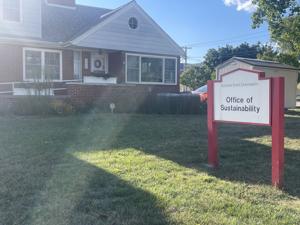
- Part-time job fair aims to provide opportunities to build skillsAs the school year kicks off, many students at Illinois State University may be seeking employment throughout the year. Career Services is hosting a part-time job fair for students from 2-4 p.m. on Sept. 3 at the Bone Student Center. Career Services Assistant Director for Marketing and Communication Susan Whitsitt shared details on what students can expect going into the fair. “Students can expect to connect with organizations that have part-time positions available on or near campus,” Whitsitt said. “We currently have 15 registered to attend. Most will have students apply for positions, and some may even interview them on the spot.” Whitsitt detailed steps that students can take to prepare themselves for the fair. “They should dress for an interview; they don’t need to wear a business suit, but they should consider wearing pants instead of shorts; a blouse, polo, or button-down shirt instead of a t-shirt, and closed-toed shoes instead of flip flops,” Whitsitt said. “They should know or bring their class schedule so they can let the employers know when they are available to work.” The job fair is designed for all students to be able to find a part-time job, no matter their major. “Part-time jobs are an excellent way for students to develop new skills, build connections, explore organizations and careers, and apply what they are learning in the classroom into real-life experiences,” Whitsitt said. “In this way, they can incorporate the skills they utilized and developed into their resumes later when applying for internships and full-time positions.” Career Services Event Coordinator Rachel Janicki explained changes being made to the fair from previous ones. “A big change for this fall is the location; we tried hosting a part-time job fair in Prairie Room for the first time this spring, and we found it was much better suited to this fair’s needs, so we’ll be hosting it in Prairie again this fall.” If students are not able to attend the upcoming job fair, it will return in the spring.

- Bloomington-Normal hosts another successful Sweet Corn CircusElotes, pro wrestling, clowns and acrobats — the Sweet Corn Circus had it all. This past weekend, Bloomington-Normal hosted its annual Sweet Corn Festival to celebrate its agricultural roots. More than 100 vendors attended the festival to sell a variety of food and goods to visiting families and students in attendance. Full performances and acts from Illinois State University's Gamma Phi Circus entertained the crowd every hour of both days. Circus member Keilani Haddon said the event was “perfect for members to get to know each other better.” “It’s been a lot of bonding because we spend a lot of hours with each other… It’s actually really nice, we get to talk to people we don’t usually talk to, and it’s really fun to walk around with everyone and spend money,” Haddon said. Haddon emphasized the success of this year’s festival. “The turnout has been super great [for our show]. The lower level is always filled, people go in the grass, on the stairs and even in the balcony now,” Haddon said. “We have a completely full audience … It’s so lovely.” Gamma Phi Circus member McKinley Cwikla said she loved seeing people excited to watch the show. “[We] don’t realize how many people support us in the community until we see them all come together,” Cwikla said. “I never would’ve expected the [number] of people that have come, especially because we have multiple shows and we’re doing stuff we already did, but people still want to see it.” Attendee Montana White enjoyed watching one of the Gamma Phi Circus. “From what I could see, [the circus] was really interesting and cool. This is definitely a cute area where you can see portions of what the ISU circus is doing,” White said. While White liked the show, she felt that there was not enough space for the number of people and vendors at the festival. “I definitely feel like there should be a lot more activities and maybe more availability for space, it is pretty tight,” White said. At 1 p.m. Saturday and Sunday, the Uptown Circle was packed for the Iron Spirit Pro Wrestling event. The crowds watched professional wrestlers “knock out” one another to victory. Noah Hutton and his family watched the showdown and said it was very entertaining – a younger Hutton said his most comical character was “Good Boy.” “The dog [barking] in the middle of Good Boy’s match was great,” the family said as they recalled the mutual barking competition between the wrestler and the dog in the crowd. With the crowds drawn in by the circus and wrestling, many vendors were pleased with the foot traffic. Bags by Brenda, C.E.O. Brenda Teske crafted cross-body bags, purses, backpacks and a variety of accessories for visitors to purchase as they made their way through the crowd. “I enjoy making them, and I knew I could only give away so many, so I started a business with them,” Teske said. The Bloomington Bison hockey team set up a booth that contained a shooting board for visitors to test their skills and learn more about upcoming events. Director of Community Relations and Partnership Fulfillment Maddie Keefe explained why the team loved attending the festival. “It's been great growing a hockey community here. We have a small, tight-knit group of fans that know us by name, which is really fun,” Keefe said. “In addition to meeting all of the people who travel from here, it's been nice [meeting] new people and showing them what the Bison are all about.” The festival concluded at 4 p.m. on Sunday — a preview of fall in the air dropped to mid-60 temperatures.

- SGA discusses budget, involvement at first meeting of the fall semesterIllinois State University’s Student Government Association (SGA) held its first meeting of the fall semester this past Wednesday. The meeting focused primarily on SGA’s budget for the upcoming year, which will be voted on at the next meeting. “Last year, we were way under budget, so we had a massive surplus of funds, which is not a bad thing. It just means we, as an association, need to be prudent and spend more money,” Student Body Chief of Staff Sam Majka said. If approved, the budget will look similar to last year’s with some subtle changes. The Civic Engagement Committee would face a $1,000 cut, as they were “almost frantic to try and spend the money,” according to Majka, who chaired the committee last year. However, the money would not be cut from the budget entirely; it would move to the general initiative fund and be available if needed. SGA President Noah Montoya explained his plans to get feedback from the student body to start the semester. “I’ve reached out to RSO presidents, and I’m looking to have a one-on-one meeting with them. My goal with these meetings is to hear directly from student leaders,” Montoya said. “The hope is that when I meet with [ISU President] Tarhule on September third, that collecting that feedback will help me figure out how to represent the student body effectively in that conversation,” Montoya continued. SGA Advisor and Assistant Vice President and Dean of Students Andy Morgan spoke on increased amounts of involvement. “One of the things that we’re seeing a lot more [of] is our new students getting more engaged and getting more involved. They have high expectations with ISU and how they can be engaged…we’ve seen a lot more students be involved in welcome week activities,” Morgan said. The Ex-Officia also gave their first reports of the year. Interfraternity Council Ex-Officio Cayden Akers shared how their numbers have been up this year, supporting Morgan’s claim. “We just had our first IFC event last week, and we had, I believe, 60 to 70 [potential new members] show up. That’s huge. We used to [have] events with like four guys showing up,” Akers said. The next SGA meeting will be held at 7 p.m. on Sept. 3 in the Old Main Room of the Bone Student Center.
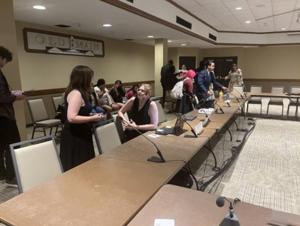
- Make friends and join clubs at Festival ISUAre you new to campus? Want to make new friends this semester? Interested in getting more involved on campus? If so, Festival ISU may be perfect for you! This year, Festival ISU is from 10 a.m. to 2 p.m. Tuesday and Wednesday on the Quad. Festival ISU is the annual student involvement fair where students can discover the variety of Registered Student Organizations (RSOs) offered at Illinois State University. There are more than 250 organizations that will be displayed, including social sororities and fraternities, club sports and much more to fit students' different interests. With the number of organizations available, Commencement and Special Events Coordinator Amy Miller suggested coming prepared. “This event can be overwhelming when you first see it. Have a plan,” Miller said. “Determine the types of organizations you’re looking to get involved in. If it is your first semester at ISU, consider joining one group related to your career path and one group for fun. You need both to be successful,” Miller continued. Students can find more information on which RSOs are attending Festival ISU on Redbird Life. To view the festival map, students can visit the Dean of Students website.
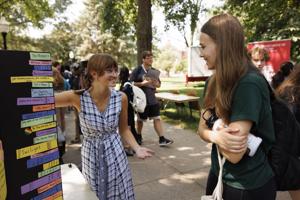
- Meet your foreve-RSO at ‘Fall into Fell’ COM FestDo you love to write? Work with photography? Create social media content? You can do all that and more by joining The Vidette! Come check us out at the School of Communication (SOC) from 3-5 p.m. Wednesday at Fell Hall for COM Fest. The festival gives students the opportunity to connect with fellow classmates and explore their calling within the SOC. WZND, PRSSA, the Association for Women in Communication, Student Television Workshop, SOC graduate organizations and other established organizations will be in attendance. “We host our fall welcome back party — Fall into Fell — to give our COM RSOs, media, and support programs a chance to connect with students in a more focused manner, away from the fun craziness of Festival ISU,” Public Relations Program Coordinator Rebecca Hayes said. Besides new faces, COM Fest will offer a variety of goodies, including drop-in advising, fun swag, popsicles and ice cream, according to Hayes. COM Fest will help students meet people from their majors and throughout the School, both older and younger, outside of the fun experiences each RSO provides. “[It can provide] a great network of friends throughout the [SOC], making classes, group work and [weekends] more fun,” Hayes said.
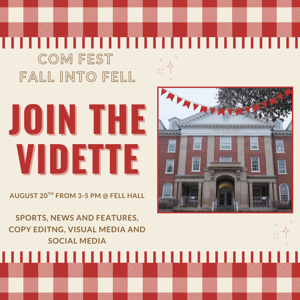
- ISU students take 'Fear the Bird' to a new levelStudents had much to say after Illinois State University introduced a newly designed Reggie Redbird through a collaborative Instagram post. The redesigned mascot sparked backlash before the start of the academic year, with more than 600 comments from past and present Redbirds expressing their dislike of Reggie’s new look. As students have begun their campus lives, many shared their opinions on the Redbird. Sophomore marketing major Garrett Loughran was one of many students unhappy with the bird’s new look. “Reggie Redbird's new look—what have they done? In the wise words from the movie 'The Godfather': ‘Look how they massacred my boy,’” Loughran said. “I get it — to please new people coming in—but they could have done a better job. There is going to be [backlash], there already has been,” Loughran continued. Freshman communication sciences major Kyra Craddock shared her thoughts on the legacy of Reggie’s previous look. “He reminds me of a Looney Tunes character, and I don’t like him,” Craddock said. “We've had the old Reggie for so long, I think he’s become kind of an icon, and changing it ruins that.” Sophomore English education major Sian Page was also not fond of Reggie. “I am actually quite scared of Reggie. I feel like if I go close enough to him, I’m gonna see the actual person inside of [the mascot],” Page said. Page felt students would get used to him, even if it takes time. “I’ve seen on social media [students] will be like ‘Oh, it’s not that bad.' But I don’t know—I don’t like the big, bulgy eyes,” Page said. Sophomore special education major Zitlalyk Luna also emphasized the size of Reggie’s eyes. “I think he looks a little crazy, honestly. His eyes are definitely wide open. I think it’s a cute look, but I don’t know, I’m a little iffy about it. I do feel like he looks more welcoming in a way,” Luna said. Some students found Reggie’s updated look appealing. Freshman sociology major Jociaya Edwards said the new Reggie gave her a ‘done-with-the-ex’ vibe. “I think the new Reggie makeover is actually really cool. He got a glow-up… he’s moving on to what’s good,” Edwards said. While opinions vary, some students are warming up to the new Reggie and enjoy seeing him around campus. “At first I thought he was kind of funny-looking, but I think as time is going on, I’m getting used to it,” freshman social work major Rosa Paneda said. “I think [students] will definitely warm up to him.”
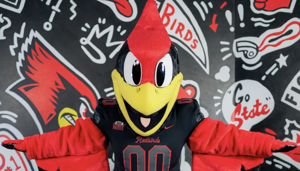
- Reggie Redbird brings a new look to the 2025-26 school yearIllinois State University’s Reggie Redbird flew in with a fresh look. Illinois State Athletics (ISA) revealed the reimagined Redbird through an Instagram post featuring Reggie through the years, concluding with the introduction of the 2025 mascot. The “bold new look” was said to concur with ISU’s commitment to tradition and innovation, according to a release from ISA The design was led by ISU Marketing and Communications in partnership with Redbird Athletics to blend decades of passion and pride. Creating a “bolder, more expressive” Reggie was intended to reflect a stronger image of the mascot. “The changes in the costume allow him to be more involved in game day activities, because of a greater ability to move freely. We finally got our Bird a new pair of shoes!” Illinois State Director of Athletics Dr. Jerri Beggs said. “The bottom line is that Reggie is important to all of us and the heart of Reggie has not changed, just his appearance." ISA shared that the official introduction of the fan-favorite mascot will take place on Sept. 6 at Hancock Stadium.

- SGA holds final meeting of semester, welcomes new associationIllinois State University’s Student Government Association (SGA) held its last meeting of the semester on Wednesday. It was the first meeting of the new association.New leadership positions were elected internally within the legislative branch. They also appointed three secretaries, four senators and confirmed five ex officio.Off-Campus Senator, Emma Susami, ran for speaker of the assembly, a position which was formerly known as president of the assembly. “I’m passionate about making a difference both within and outside of [SGA] meetings,” Susami said. “I see the position of the speaker of the assembly to be one that focuses on the efficiency and teamwork of the association. I also would like to hold all of you accountable for the work that you have signed yourself up for.” Susami elaborated that she would perform random check-ins to ensure that association members are actively involved. Pride Representative Vincent Smock spoke about their experiences with Susami. “Emma was one of the first SGA members that I met in the fall…she is absolutely a ball of energy,” Smock said. “She knows exactly what she is doing. Emma is one of the most organized and competent people I’ve ever met.” Susami was elected to be the secretary of the assembly with 99% of the vote. Student Life Senator, Abhijith Jannu, ran for vice speaker of the assembly. “As vice speaker, I want to focus on our contact with constituents, trying to make it less robotic and more real. Too often, we see these types of constituents like check boxes, and I want us to start having more person-to-person conversations, getting to know what students care about and not just sending them forms or surveys which they more often ignore,” Jannu said. Cardinal Court Senator, Edgar Chavez, praised Jannu. “I worked very closely with Senator Jannu in the days leading up to diversity week,” Chavez said. “He’s a very hard worker. I spoke to him early on when he talked about running for vice president of the assembly and it is something that he is very passionate about.” Jannu was elected to be vice president of the assembly with 99% of the vote. College of Business Senator Joshua Sweedler ran for secretary of the assembly. “I believe my experience, preparation and dedication make me a strong fit for this role,” Sweedler said. “To prepare for this position, I’ve met with former secretary [Ella Sharp] multiple times where she generously walked me through the expectations of the role and shared the strategies that contributed to her success. Thanks to those conversations, I feel well equipped to take on [the] responsibilities and serve the assembly.” College of Fine Arts and College of Nursing Senator Angel Trader commended Sweedler’s organizational habits. “[Josh and I] came into the association together, and let me tell you, he’s a very organized person. I always joke about stealing his notes and stuff; he literally sits here and takes notes about everything,” Trader said. Sweedler was elected as secretary of the assembly with 100% of the vote. Ross Vancil was appointed as the secretary of college affordability. “He really taught me a lot about student government, and he was able to answer all my questions,” said Watterson senator Lennon Stoner. “He’s really nice [and] he would always ask me about his events and things that I think [could] be better. He always cared about hearing another opinion, even if it was something he thought was already perfect.” Evan Nelson was appointed as the secretary of information technology. “He’s quick, efficient and he’s doing a lot of good work with the messy website he was handed,” said Off-Campus Senator Matthew Rickey. Jovana Emerick was appointed as the secretary of public relations. “She has been a phenomenal PR secretary,” said Sweedler. “Every single event—especially the SGA ones—she shows up, takes as many pictures as possible and she gets those posts out as soon as possible. She does a great job speaking to people on campus.” Student Body President Noah Montoya also briefly spoke about a shooting at ISU last Sunday during his executive report. “I want to start this off by taking a moment to acknowledge a recent act of violence that occurred on campus Sunday evening,” Montoya said. Although the incident was isolated, its impact has been deeply felt across our student body. Some members of our student body were nearby, witnessed the aftermath or are feeling shaken.” Four senators were also appointed: Off-Campus Senator Matthew Rickey, Off-Campus Senator Miguel Figueroa-Fragoso, Off-Campus Senator Mikalya Blum and Education Senator Ella Pettit. Additionally, five ex officio were confirmed with Emily Cardinal representing the Association of Residence Halls, Anthony Tamayo representing the Association of Latin American Students, Vincent Smock representing Pride, Chrissy Abobon representing the Asian Pacific American Coalition and Isabella Tornabene representing Students Ending Rape Culture.

- Students react to Bone Student Center shooting incidentThe shooting incident at Illinois State University’s Bone Student Center Sunday night left students reflecting on campus safety and protocols. Although the investigation is ongoing, freshman nutrition and dietetics major Ave Beatty thought the ISU Police Department (ISUPD) handled the situation well. “As far as the response from the University police, I think they did a really good job with responding to [the shooting] quickly,” Beatty said. Stephany Ortiz, a freshman Spanish education major, also felt the police responded well, but is concerned that the person of interest is not in custody. “There were, like, 13 police cars out there, which is more than [usual], but I find it odd that they haven’t found whoever did it yet,” Ortiz said. Ortiz was not the only student worried about the police looking for the person of interest. Junior marketing major Owen Reeter believes classes should have been canceled on Monday. “I don’t think [the University] has done the best job, especially since [ISUPD] haven’t caught the guy yet, and we’re still in classes, I think it’s kind of crazy,” Reeter said. Some students were concerned about the emergency alerts they received while the incident occurred. “I think as far as getting information out at the time of it, they could’ve done better, but also at the same time, I don’t think they knew much,” Beatty said. ISU Chief of Police Aaron Woodruff discussed the difficulties in relaying information during the incident. “The challenge in any type of situation like this is how quickly we can get that information out while still being able to respond and deal with what’s happening on the ground there and actually collect the information from people present,” Woodruff said. ISU President Aondover Tarhule sent an email to students on Monday morning regarding the incident. Junior organizational communications and leadership major Frankie Garcia believes Tarhule should do more to support students at this time. “I feel like he did the minimum. All he did was send out an email, and it was the next day,” Garcia said. Ortiz also felt Tarhule’s message was ineffective. “It was too late, and I feel like it was just summarizing the alerts we already received last night,” Ortiz said. “Everything he said was already something we got in real time.” With the incident occurring at the Bone, Reeter said its close proximity makes students feel unsafe on campus. “I know this isn’t the first shooting we’ve had either, so it’s definitely in the back of people’s minds,” Reeter said. “What they could do is just add a little security on campus. We obviously are never expecting that to happen here, but it happened.” Freshman music education major Campbell Manning said that while the shooting was an isolated incident, it still instills fear. “I definitely think that they should make more strong regulations on it; it makes me a little more nervous because this is supposed to be a safe place,” Manning said. Walk-in counseling services are available to students at the Student Services Building. Students can also call 309-438-3655 for immediate support. “It’s unfortunate that we have to go through this in our schools,” Beatty said. “If anyone needs help, reach out to people, get counseling.”

- Tarhule issues statement on Sunday's shooting incident at the Bone Student CenterIllinois State University President Aondover Tarhule issued a statement Monday following the shooting incident that occurred at the Bone Student Center Sunday night. In an April 28 email to students, faculty and staff, Tarhule expressed his concern for the victim, and his "shock and anger" over the incident taking place on campus. Tarhule then shared resources available to students, faculty and staff experiencing distress over the incident. Urgent walk-in counseling services will be available for students in Room 320 of the Student Services Building. Mental health services for faculty and staff are available by contacting ComPsych at 833-955-3400 or 800-697-0353. Anyone needing to retrieve personal items left behind may do so today until 4:30 p.m. at the Welcome Desk on the first floor of the Bone Student Center. The Bone Student Center will reopen at 7 a.m. Tuesday, April 29, and Tarhule said all employees should report to work as regularly scheduled. Tarhule reiterated that the isolated incident remains under investigation by ISUPD, and encouraged the campus community to remain united during this "challenging moment." "Let us lean on one another with compassion and strength in this challenging moment. Let us call on the support, kindness and resilience that have always defined the Redbird community and stand united as we continue building a safe, caring future together," Tarhule said in the email.

- ISUPD releases photos of person of interest in shooting incidentThe Illinois State University Police Department released photos of the person of interest in a shooting incident at the Bone Student Center. On Sunday night, a fight broke out between two groups of people during a registered student organization (RSO) event at the Bone Student Center that ended with a non-life threatening-gunshot wound to a non-student. The victim was transported to a local hospital, and the person of interest fled the scene. ISUPD responded with all available resources and was assisted by Normal Police, Bloomington Police, the McLean County Sheriff, Illinois State Police and the Normal Fire Department. Anyone with information is urged to email ISUPD at ISUPolice@IllinoisState.edu or by calling 309-438-8631.

- ISU reports shots fired at the Bone Student CenterIllinois State University says there is one reported injured victim from a shooting during a registered student organization (RSO) event at the Bone Student Center. The University issued an emergency alert regarding shots fired at approximately 7:55 p.m. on Sunday. The victim is not an ISU student. Shots were fired as a result of a fight at the entryway outside of the RSO event, according to ISU Media Relations. In an ISU Emergency Alert email, ISU said to take precaution. In an update email, ISU said a person "reportedly discharged a firearm on or near campus." The email also said the person may be armed/dangerous, and there is a potential immediate threat. Police described this suspect as a slender Black male, 5'10, with an afro hairstyle wearing all black. The male was last seen running south from the Bone Student Center. Some earlier reports said that the shots fired could have been the result of a fight. This information was confirmed in an email from ISU Media Relations. At 9:23 p.m., ISU said the Bone Student Center is closed as police continue to investigate. An all-clear has not yet been issued. ISU is urging people to stay away from University and Locust Street and the Bone Student Center. There is no shelter-in-place order set. At 11:41 p.m., ISU sent another email titled "Shots Fired Incident Update." In this email, ISU said employees assigned to work in the Bone Student Center should not report to campus for work on Monday unless told otherwise. All events scheduled on Monday at the Bone Student Center are canceled. Information will be shared later for those who left belongings at the Bone Student Center during the time of the shooting. Classes will continue on Monday. The Illinois State University Police Department is still investigating this incident with assistance from the Normal Police Department, Bloomington Police Department, McLean County Sheriff’s office and Illinois State Police. Immediate counseling resources are available to students, faculty and staff. Email vidette@ilstu.com with eyewitness information. This story will be updated.

- 'You Grow, Redbird!' provides a tree-mendous experience for studentsStudents had a tree-mendous time at “You Grow, Redbird!” on Tuesday in the Brown Ballroom of the Bone Student Center. “You Grow Redbird!” was hosted by Event Management, Dining and Hospitality (EMDH), along with six other ISU organizations to celebrate Earth Day and provide a break for students before finals. Students had the opportunity to pot their own plant, complete coloring sheets and learn about taking care of themselves at a self-care station. EMDH Assistant Director of Marketing and Communications Samantha Schultz emphasized the importance of student self-care and its relation to this event. “Doing something like [this] gives [students] an opportunity to treasure Earth and treasure where they live,” Schultz said. “Then, they have to go on and keep thinking about it; they have to water their plant and give it sunlight, something that they should also be doing for themselves,” Schultz continued. In previous years, the event was the Succulent Cafe, but Schultz discussed why they changed it. “This year we rebranded to ‘You Grow, Redbird!’ because we try to add a wellness component to all of our events now, and it opened it up to what kind of plants we could use,” Schultz said. “We also partnered with the Multicultural Center to spread the word to more people.” Senior recreation and sports management major Clara Nesvacil appreciated the opportunity to destress on Earth Day. “I think it’s a good reminder to take care of our planet, that’s what Earth Day is all about,” Nesvacil said. Sophomore occupational health and safety major Kaytlyn McGray highlighted the need for students to take a break from schoolwork at this time of the year. “It gives people a sense of escape, and people are able to come here and not worry about a test they have to do later,” McGray said. McGray liked being able to pot a plant and taking care of something that benefits the planet. “We are able to give back to the community, planting our own plants and being able to house a plant rather than ripping it up from where it is,” McGray said. Schultz was happy with the turnout of students and said students were still arriving after an hour of being open. This was the last EMDH event of the semester, but Schultz encourages students to follow Redbird Life for updates. “We will be having a ton of fun things coming up in the fall, hopefully we will have a concert in the fall as well, but we’ll keep everyone in the know,” Schultz said.

Loading...


